|
BACKGROUND
PARABLES AND THEIR MEANINGS
The
full background to this teaching is available online at this link
Read Background Here
|
Online links to scriptures (New International Version [NIV] unless otherwise stated) are shown in blue
| THE PARABLE OF THE SOWER |
|
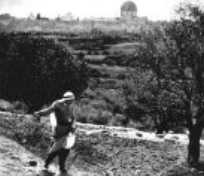 That same day Jesus went out of the house and sat by the lake. 2 Such large crowds gathered around him that he got into a boat and sat in it, while all the people stood on the shore. 3 Then he told them many things in parables, saying: “A farmer went out to sow his seed. 4 As he was scattering the seed, some fell along the path, and the birds came and ate it up. 5 Some fell on rocky places, where it did not have much soil. It sprang up quickly, because the soil was shallow. 6 But when the sun came up, the plants were scorched, and they withered because they had no root. 7 Other seed fell among thorns, which grew up and choked the plants. 8 Still other seed fell on good soil, where it produced a crop—a hundred, sixty or thirty times what was sown. 9 He who has ears, let him hear.†(Matthew 13:1-9) That same day Jesus went out of the house and sat by the lake. 2 Such large crowds gathered around him that he got into a boat and sat in it, while all the people stood on the shore. 3 Then he told them many things in parables, saying: “A farmer went out to sow his seed. 4 As he was scattering the seed, some fell along the path, and the birds came and ate it up. 5 Some fell on rocky places, where it did not have much soil. It sprang up quickly, because the soil was shallow. 6 But when the sun came up, the plants were scorched, and they withered because they had no root. 7 Other seed fell among thorns, which grew up and choked the plants. 8 Still other seed fell on good soil, where it produced a crop—a hundred, sixty or thirty times what was sown. 9 He who has ears, let him hear.†(Matthew 13:1-9)
|
| THE EXPLANATION OF JESUS |
|
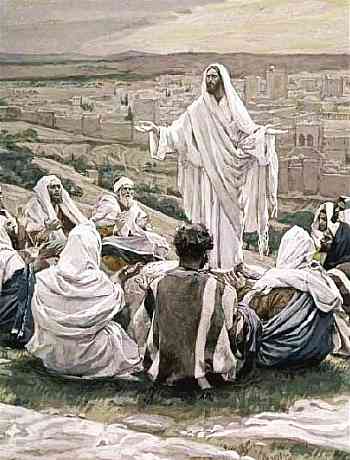 “Listen then to what the parable of the sower means: 19 When anyone hears the message about the kingdom and does not understand it, the evil one comes and snatches away what was sown in his heart. This is the seed sown along the path. 20 The one who received the seed that fell on rocky places is the man who hears the word and at once receives it with joy. 21 But since he has no root, he lasts only a short time. When trouble or persecution comes because of the word, he quickly falls away. 22 The one who received the seed that fell among the thorns is the man who hears the word, but the worries of this life and the deceitfulness of wealth choke it, making it unfruitful. 23 But the one who received the seed that fell on good soil is the man who hears the word and understands it. He produces a crop, yielding a hundred, sixty or thirty times what was sown.†(Matthew 13:18-23) “Listen then to what the parable of the sower means: 19 When anyone hears the message about the kingdom and does not understand it, the evil one comes and snatches away what was sown in his heart. This is the seed sown along the path. 20 The one who received the seed that fell on rocky places is the man who hears the word and at once receives it with joy. 21 But since he has no root, he lasts only a short time. When trouble or persecution comes because of the word, he quickly falls away. 22 The one who received the seed that fell among the thorns is the man who hears the word, but the worries of this life and the deceitfulness of wealth choke it, making it unfruitful. 23 But the one who received the seed that fell on good soil is the man who hears the word and understands it. He produces a crop, yielding a hundred, sixty or thirty times what was sown.†(Matthew 13:18-23)
|
|
|
 The most interesting thing about this explanation is not what was said, but what wasn’t! For Jesus clearly explains who enters the Kingdom of God as He describes the people illustrated by each soil type. Of course, all but the final group didn’t make it. The most interesting thing about this explanation is not what was said, but what wasn’t! For Jesus clearly explains who enters the Kingdom of God as He describes the people illustrated by each soil type. Of course, all but the final group didn’t make it.
While this explanation shows how people enter the Kingdom, Jesus did not explain the key last sentence, which is about the Kingdom working in us. This ‘punch line’, potentially the deepest and most important part of the parable to the Christian, that of the seed grown in the good soil, is unexplained, but left for each of us to discover and apply to our own life. He explains all about the soil, but ignores the seed! Amazing! He and His Word (which of course is Him!) are just so full of surprises, of revelation, of unexplained depths of meaning, deliberately left waiting for the Holy Spirit to reveal to us.
|
| NOT ALL CHRISTIANS ARE THE SAME |
|
 In a world seduced by a veneer of democracy, where all are supposedly equal, if only on Election Day, the concept of a heaven where everyone is the ‘same’ has natural appeal. In a world seduced by a veneer of democracy, where all are supposedly equal, if only on Election Day, the concept of a heaven where everyone is the ‘same’ has natural appeal.
We all know that we receive the same salvation, whether we have lived for God for 40 years or 40 minutes. The parable of the workers in the vineyard reveals that aspect of the Kingdom to us. The entry price is the same for all - acceptance of, and obedience to, Jesus.
|
|
|
 However this equality of entry principle so easily leads to the popular misconception that there is also an equal reward for all, once entry is gained. Trying to put heaven into a human perspective is impossible, but the best example I can think of right now, is going to the theatre. All the seats to the performance are the one price of salvation through grace. But once you are inside, the ushers direct you to your individual seat, reserved in advance of your arrival. And the location of our seat is determined by our actions before we enter. For it is obvious that not everyone can sit in the middle, 5 rows from the front, in the very best seat in the house. While we all will see the play, some will inevitably see it from one side or the other, others from further back or even from the ‘gods’! (That is, the seats upstairs at the very top and back of the house.) Please excuse the terrible pun! However this equality of entry principle so easily leads to the popular misconception that there is also an equal reward for all, once entry is gained. Trying to put heaven into a human perspective is impossible, but the best example I can think of right now, is going to the theatre. All the seats to the performance are the one price of salvation through grace. But once you are inside, the ushers direct you to your individual seat, reserved in advance of your arrival. And the location of our seat is determined by our actions before we enter. For it is obvious that not everyone can sit in the middle, 5 rows from the front, in the very best seat in the house. While we all will see the play, some will inevitably see it from one side or the other, others from further back or even from the ‘gods’! (That is, the seats upstairs at the very top and back of the house.) Please excuse the terrible pun!
|
|
|
 This ticketing process, such an important truth, Jesus was revealing through this parable. His parables are indeed designed to show Christians the deeper truths of His Kingdom. It's very good to hear about, perhaps with a smug sense of satisfaction, the three types of seed that haven’t made it to the stage of fruiting. But the emphasis and real point of the parable is on the fourth group, those who grow to harvest, who produce fruit. This ticketing process, such an important truth, Jesus was revealing through this parable. His parables are indeed designed to show Christians the deeper truths of His Kingdom. It's very good to hear about, perhaps with a smug sense of satisfaction, the three types of seed that haven’t made it to the stage of fruiting. But the emphasis and real point of the parable is on the fourth group, those who grow to harvest, who produce fruit.
|
|
|
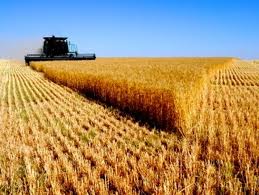 While you can easily get bogged down and side tracked as to whether any of the first three groups made it into Heaven, this is not the real reason Jesus spoke. Briefly, the Calvinist school of theology would surely say some of these people did get there, because of their ‘once saved, always saved’ beliefs. The Armenians on the other hand, would argue none of these first three groups made it, as faith is to be ongoing and reflected in continuing works, which obviously wasn’t the case with any of these groups. While you can easily get bogged down and side tracked as to whether any of the first three groups made it into Heaven, this is not the real reason Jesus spoke. Briefly, the Calvinist school of theology would surely say some of these people did get there, because of their ‘once saved, always saved’ beliefs. The Armenians on the other hand, would argue none of these first three groups made it, as faith is to be ongoing and reflected in continuing works, which obviously wasn’t the case with any of these groups.
But the main point Jesus was making in the parable was this. Although all the seeds sown in the good soil are of a similar high quality and fertility, some will produce a 30-fold crop, some a 60-fold crop and the remainder, a stupendous, 100-fold harvest. So the real question is, “What causes or determines the differences in the harvest?†Jesus is saying that not all Christians are the same, but that some bear more fruit, or grain in this case, than others. This is the ‘Kingdom’ truth He was truly revealing.
|
|
|
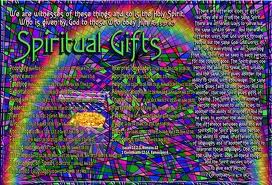 Returning to our explanation of crop growing in the natural, we can see that of the four elements going towards making a crop successful, two can be immediately ruled out. Both the seed and the soil are of the same quality for all the ‘Christian Harvest.’ So that leaves the two remaining requirements of ‘Crop Care’ and ‘Acts of God.’ Returning to our explanation of crop growing in the natural, we can see that of the four elements going towards making a crop successful, two can be immediately ruled out. Both the seed and the soil are of the same quality for all the ‘Christian Harvest.’ So that leaves the two remaining requirements of ‘Crop Care’ and ‘Acts of God.’
Acts of God, or circumstances beyond our control, or God making some of us more fruitful than others, has a certain appeal as an explanation. Personal responsibility for our actions, or rather, the lack of them, is absolved. It's always convenient to blame our lack of performance in life and God, on someone or something else, isn't it? Although it is true that the ‘Gifts of the Spirit’ are given out in differing quantities and type as God pleases, we all have equal opportunity to develop the ‘Fruit of the Spirit’ in our lives. To produce a 30 fold, 60 fold or 100 fold harvest. Yes, the harvest in this parable is about fruit, not gifts.
Gifts are given and gifts will end, as the scripture tells us:
1 Corinthians 13:8
|
|
|
 The gifts pass away, marked 'return to sender', our God, for they were His to give in the first place. So when we get to heaven, the greatest evangelist, prophet or healer will no longer be able to exhibit the gifts that made them such heroes of the faith while on earth. All will be stripped away, and their spiritual fruit, the ultimate of which is love, will be all they will have to show. So we can now truly understand the Kingdom truth Jesus was speaking of when He said, The gifts pass away, marked 'return to sender', our God, for they were His to give in the first place. So when we get to heaven, the greatest evangelist, prophet or healer will no longer be able to exhibit the gifts that made them such heroes of the faith while on earth. All will be stripped away, and their spiritual fruit, the ultimate of which is love, will be all they will have to show. So we can now truly understand the Kingdom truth Jesus was speaking of when He said,
Matthew 19:30
|
|
|
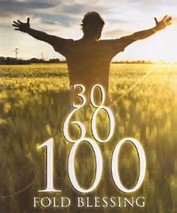 It’s so easy to say, “If only I had their gifts, my Christian walk would be much better than it is.†Another excuse - for it’s simply not true. Those with great gifts are often remarkably ordinary people, with many human failings, just like you and I – me anyway! Most often it is harder for the gifted person to build fruit in their lives, as the ‘gifts’ they have been given make it look as if their fruit has developed, when, in reality, it’s the fruit of the gifts, and not their own fruit at all. It’s so easy to say, “If only I had their gifts, my Christian walk would be much better than it is.†Another excuse - for it’s simply not true. Those with great gifts are often remarkably ordinary people, with many human failings, just like you and I – me anyway! Most often it is harder for the gifted person to build fruit in their lives, as the ‘gifts’ they have been given make it look as if their fruit has developed, when, in reality, it’s the fruit of the gifts, and not their own fruit at all.
So this leaves us with the one remaining element of ‘Crop Care.’ Here the analogy with the natural breaks down a little. For instead of the farmer in the natural looking after the crop to achieve an even result overall, in the spiritual we, the seed, are individually responsible for the production of our own fruit. We must fertilize and water, that is nurture, the spiritual seed implanted in us at the time of our salvation, to produce the 30, 60 or 100 fold crop referred to.
James 1:2-4
|
|
|
Yes, it is the development of the Fruit of the Spirit in our life that brings us to maturity, that determines of the size of our spiritual harvest.
|
| THE DIFFERENCES BETWEEN HARVESTS |
|
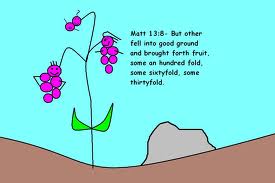 As we will see shortly, it is not by chance that Jesus quotes 3 levels of Harvest. What is particularly interesting though, are the differences in production levels. The first group, the 30-fold harvest, obviously produces thirty times the amount of seed that was sown. (30 - 0 = 30) The second group doubles the first group's harvest at the 60-fold level. (60 - 30 = 30) The final 100-fold harvest level however, shows the greater incremental increase of 40 fold over the second group. (100 - 60 = 40) This is significant in that those who show the greatest level of commitment produce not only the largest crop, as would be expected, but one that is also greater relatively, than those of their less committed counterparts. This is a hugely important truth, as we will see. As we will see shortly, it is not by chance that Jesus quotes 3 levels of Harvest. What is particularly interesting though, are the differences in production levels. The first group, the 30-fold harvest, obviously produces thirty times the amount of seed that was sown. (30 - 0 = 30) The second group doubles the first group's harvest at the 60-fold level. (60 - 30 = 30) The final 100-fold harvest level however, shows the greater incremental increase of 40 fold over the second group. (100 - 60 = 40) This is significant in that those who show the greatest level of commitment produce not only the largest crop, as would be expected, but one that is also greater relatively, than those of their less committed counterparts. This is a hugely important truth, as we will see.
|
| GOD WORKS IN THREES |
|
 There are many patterns of 'three' found right throughout the Bible. Of course, we must start with the most important and difficult to understand of all - God himself. For God is three, Father, Son and Holy Spirit, yet He is also one. A mystery we do not yet, but one day will, fully understand. There are many patterns of 'three' found right throughout the Bible. Of course, we must start with the most important and difficult to understand of all - God himself. For God is three, Father, Son and Holy Spirit, yet He is also one. A mystery we do not yet, but one day will, fully understand.
However, God clearly works in patterns of three, in most important matters of history and revelation. (See A Revelation of… The Power of Three.) And generally, each of the three parts of the pattern emphasizes one aspect or person, of the Godhead. While the three are always present, there will be a particular emphasis on the one, either Jesus, the Holy Spirit, or the Father. As we look at each member or aspect of the Godhead, we see a reflection of the other two. For the three are inseparable, which of course leads to the vigorous arguments between 'Trinitarians' and those of the 'Oneness' movement. Like most theological arguments, there are truths on both sides. So let's not attempt to limit God by putting Him in a box of our limited human understanding. Rather, embracing the truths revealed in both approaches, leaving room for our understanding to become complete on that glorious day when we meet Him. (Or is it them?!)
Leaving aside that which sadly separates, we can see that there are patterns of three, both in our individual lives and that of the church, reflecting the 30, 60 and 100 fold crops that Jesus taught about in the Parable of the Sower. Indeed, this is the real revelation the Lord was teaching through the parable.
|
| <i>NEXT WEEK:</i> A REVELATION OF…….THE PARABLE OF THE SOWER continues..... |
|
 ..... as we look at the parables application to our lives. ..... as we look at the parables application to our lives.
|
| A NOTE FROM DAVID |
|
Once I received the understanding that not all Christians are the same, it changed my whole appreciation of Gods Word.
The democratic principle that all are equal does not apply in the spiritual dimension where, as the Parable of the Sower, and others, show, rewards vary in the kingdom.
Worth thinking about?
|
So until next week.......
MAY GOD BLESS YOU AND YOU BLESS GOD!
His servant and yours

Learn more about us at...
www.wwj.org.nz/about.php
|
A DAVID'S DOODLING
312. At work we seek rest. In God we strive to work. Something is wrong here!
David Tait
|
Check
out the WWJ website for….
More David's Doodlings: www.wwj.org.nz/dd.php
Just jokes: http://www.wwj.org.nz/jokes.php
Waxing Lyrical: http://www.wwj.org.nz/waxing.php
If Only I'd Thought of it: http://www.wwj.org.nz/thought.php
Laughing at Ourselves: http://www.wwj.org.nz/laugh.php
|

 That same day Jesus went out of the house and sat by the lake. 2 Such large crowds gathered around him that he got into a boat and sat in it, while all the people stood on the shore. 3 Then he told them many things in parables, saying: “A farmer went out to sow his seed. 4 As he was scattering the seed, some fell along the path, and the birds came and ate it up. 5 Some fell on rocky places, where it did not have much soil. It sprang up quickly, because the soil was shallow. 6 But when the sun came up, the plants were scorched, and they withered because they had no root. 7 Other seed fell among thorns, which grew up and choked the plants. 8 Still other seed fell on good soil, where it produced a crop—a hundred, sixty or thirty times what was sown. 9 He who has ears, let him hear.†(Matthew 13:1-9)
That same day Jesus went out of the house and sat by the lake. 2 Such large crowds gathered around him that he got into a boat and sat in it, while all the people stood on the shore. 3 Then he told them many things in parables, saying: “A farmer went out to sow his seed. 4 As he was scattering the seed, some fell along the path, and the birds came and ate it up. 5 Some fell on rocky places, where it did not have much soil. It sprang up quickly, because the soil was shallow. 6 But when the sun came up, the plants were scorched, and they withered because they had no root. 7 Other seed fell among thorns, which grew up and choked the plants. 8 Still other seed fell on good soil, where it produced a crop—a hundred, sixty or thirty times what was sown. 9 He who has ears, let him hear.†(Matthew 13:1-9)  “Listen then to what the parable of the sower means: 19 When anyone hears the message about the kingdom and does not understand it, the evil one comes and snatches away what was sown in his heart. This is the seed sown along the path. 20 The one who received the seed that fell on rocky places is the man who hears the word and at once receives it with joy. 21 But since he has no root, he lasts only a short time. When trouble or persecution comes because of the word, he quickly falls away. 22 The one who received the seed that fell among the thorns is the man who hears the word, but the worries of this life and the deceitfulness of wealth choke it, making it unfruitful. 23 But the one who received the seed that fell on good soil is the man who hears the word and understands it. He produces a crop, yielding a hundred, sixty or thirty times what was sown.†(Matthew 13:18-23)
“Listen then to what the parable of the sower means: 19 When anyone hears the message about the kingdom and does not understand it, the evil one comes and snatches away what was sown in his heart. This is the seed sown along the path. 20 The one who received the seed that fell on rocky places is the man who hears the word and at once receives it with joy. 21 But since he has no root, he lasts only a short time. When trouble or persecution comes because of the word, he quickly falls away. 22 The one who received the seed that fell among the thorns is the man who hears the word, but the worries of this life and the deceitfulness of wealth choke it, making it unfruitful. 23 But the one who received the seed that fell on good soil is the man who hears the word and understands it. He produces a crop, yielding a hundred, sixty or thirty times what was sown.†(Matthew 13:18-23)  The most interesting thing about this explanation is not what was said, but what wasn’t! For Jesus clearly explains who enters the Kingdom of God as He describes the people illustrated by each soil type. Of course, all but the final group didn’t make it.
The most interesting thing about this explanation is not what was said, but what wasn’t! For Jesus clearly explains who enters the Kingdom of God as He describes the people illustrated by each soil type. Of course, all but the final group didn’t make it. In a world seduced by a veneer of democracy, where all are supposedly equal, if only on Election Day, the concept of a heaven where everyone is the ‘same’ has natural appeal.
In a world seduced by a veneer of democracy, where all are supposedly equal, if only on Election Day, the concept of a heaven where everyone is the ‘same’ has natural appeal.  However this equality of entry principle so easily leads to the popular misconception that there is also an equal reward for all, once entry is gained. Trying to put heaven into a human perspective is impossible, but the best example I can think of right now, is going to the theatre. All the seats to the performance are the one price of salvation through grace. But once you are inside, the ushers direct you to your individual seat, reserved in advance of your arrival. And the location of our seat is determined by our actions before we enter. For it is obvious that not everyone can sit in the middle, 5 rows from the front, in the very best seat in the house. While we all will see the play, some will inevitably see it from one side or the other, others from further back or even from the ‘gods’! (That is, the seats upstairs at the very top and back of the house.) Please excuse the terrible pun!
However this equality of entry principle so easily leads to the popular misconception that there is also an equal reward for all, once entry is gained. Trying to put heaven into a human perspective is impossible, but the best example I can think of right now, is going to the theatre. All the seats to the performance are the one price of salvation through grace. But once you are inside, the ushers direct you to your individual seat, reserved in advance of your arrival. And the location of our seat is determined by our actions before we enter. For it is obvious that not everyone can sit in the middle, 5 rows from the front, in the very best seat in the house. While we all will see the play, some will inevitably see it from one side or the other, others from further back or even from the ‘gods’! (That is, the seats upstairs at the very top and back of the house.) Please excuse the terrible pun!  This ticketing process, such an important truth, Jesus was revealing through this parable. His parables are indeed designed to show Christians the deeper truths of His Kingdom. It's very good to hear about, perhaps with a smug sense of satisfaction, the three types of seed that haven’t made it to the stage of fruiting. But the emphasis and real point of the parable is on the fourth group, those who grow to harvest, who produce fruit.
This ticketing process, such an important truth, Jesus was revealing through this parable. His parables are indeed designed to show Christians the deeper truths of His Kingdom. It's very good to hear about, perhaps with a smug sense of satisfaction, the three types of seed that haven’t made it to the stage of fruiting. But the emphasis and real point of the parable is on the fourth group, those who grow to harvest, who produce fruit.  While you can easily get bogged down and side tracked as to whether any of the first three groups made it into Heaven, this is not the real reason Jesus spoke. Briefly, the Calvinist school of theology would surely say some of these people did get there, because of their ‘once saved, always saved’ beliefs. The Armenians on the other hand, would argue none of these first three groups made it, as faith is to be ongoing and reflected in continuing works, which obviously wasn’t the case with any of these groups.
While you can easily get bogged down and side tracked as to whether any of the first three groups made it into Heaven, this is not the real reason Jesus spoke. Briefly, the Calvinist school of theology would surely say some of these people did get there, because of their ‘once saved, always saved’ beliefs. The Armenians on the other hand, would argue none of these first three groups made it, as faith is to be ongoing and reflected in continuing works, which obviously wasn’t the case with any of these groups.  Returning to our explanation of crop growing in the natural, we can see that of the four elements going towards making a crop successful, two can be immediately ruled out. Both the seed and the soil are of the same quality for all the ‘Christian Harvest.’ So that leaves the two remaining requirements of ‘Crop Care’ and ‘Acts of God.’
Returning to our explanation of crop growing in the natural, we can see that of the four elements going towards making a crop successful, two can be immediately ruled out. Both the seed and the soil are of the same quality for all the ‘Christian Harvest.’ So that leaves the two remaining requirements of ‘Crop Care’ and ‘Acts of God.’  The gifts pass away, marked 'return to sender', our God, for they were His to give in the first place. So when we get to heaven, the greatest evangelist, prophet or healer will no longer be able to exhibit the gifts that made them such heroes of the faith while on earth. All will be stripped away, and their spiritual fruit, the ultimate of which is love, will be all they will have to show. So we can now truly understand the Kingdom truth Jesus was speaking of when He said,
The gifts pass away, marked 'return to sender', our God, for they were His to give in the first place. So when we get to heaven, the greatest evangelist, prophet or healer will no longer be able to exhibit the gifts that made them such heroes of the faith while on earth. All will be stripped away, and their spiritual fruit, the ultimate of which is love, will be all they will have to show. So we can now truly understand the Kingdom truth Jesus was speaking of when He said, It’s so easy to say, “If only I had their gifts, my Christian walk would be much better than it is.†Another excuse - for it’s simply not true. Those with great gifts are often remarkably ordinary people, with many human failings, just like you and I – me anyway! Most often it is harder for the gifted person to build fruit in their lives, as the ‘gifts’ they have been given make it look as if their fruit has developed, when, in reality, it’s the fruit of the gifts, and not their own fruit at all.
It’s so easy to say, “If only I had their gifts, my Christian walk would be much better than it is.†Another excuse - for it’s simply not true. Those with great gifts are often remarkably ordinary people, with many human failings, just like you and I – me anyway! Most often it is harder for the gifted person to build fruit in their lives, as the ‘gifts’ they have been given make it look as if their fruit has developed, when, in reality, it’s the fruit of the gifts, and not their own fruit at all.  As we will see shortly, it is not by chance that Jesus quotes 3 levels of Harvest. What is particularly interesting though, are the differences in production levels. The first group, the 30-fold harvest, obviously produces thirty times the amount of seed that was sown. (30 - 0 = 30) The second group doubles the first group's harvest at the 60-fold level. (60 - 30 = 30) The final 100-fold harvest level however, shows the greater incremental increase of 40 fold over the second group. (100 - 60 = 40) This is significant in that those who show the greatest level of commitment produce not only the largest crop, as would be expected, but one that is also greater relatively, than those of their less committed counterparts. This is a hugely important truth, as we will see.
As we will see shortly, it is not by chance that Jesus quotes 3 levels of Harvest. What is particularly interesting though, are the differences in production levels. The first group, the 30-fold harvest, obviously produces thirty times the amount of seed that was sown. (30 - 0 = 30) The second group doubles the first group's harvest at the 60-fold level. (60 - 30 = 30) The final 100-fold harvest level however, shows the greater incremental increase of 40 fold over the second group. (100 - 60 = 40) This is significant in that those who show the greatest level of commitment produce not only the largest crop, as would be expected, but one that is also greater relatively, than those of their less committed counterparts. This is a hugely important truth, as we will see.  There are many patterns of 'three' found right throughout the Bible. Of course, we must start with the most important and difficult to understand of all - God himself. For God is three, Father, Son and Holy Spirit, yet He is also one. A mystery we do not yet, but one day will, fully understand.
There are many patterns of 'three' found right throughout the Bible. Of course, we must start with the most important and difficult to understand of all - God himself. For God is three, Father, Son and Holy Spirit, yet He is also one. A mystery we do not yet, but one day will, fully understand. ..... as we look at the parables application to our lives.
..... as we look at the parables application to our lives. 